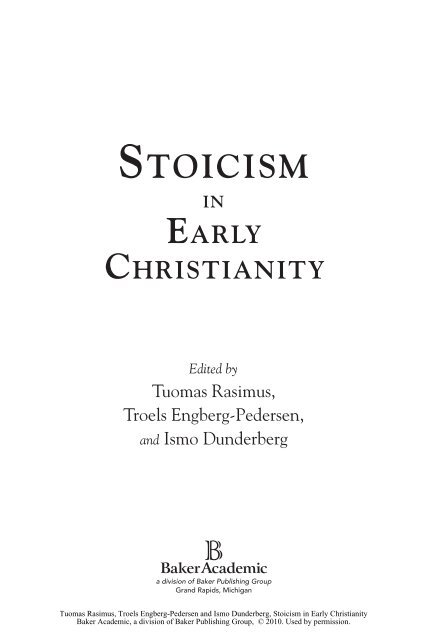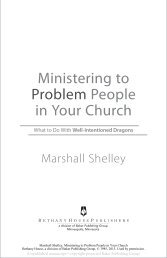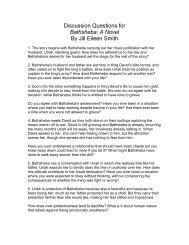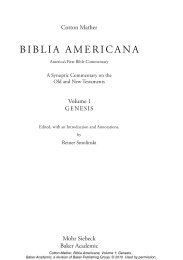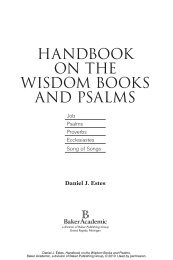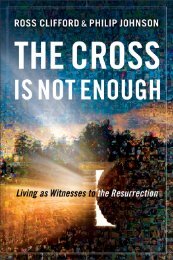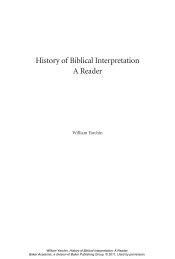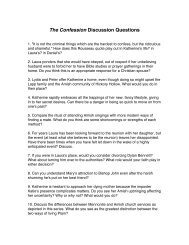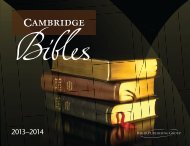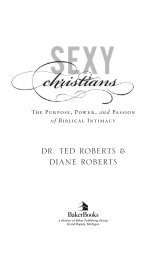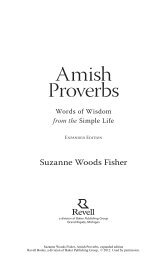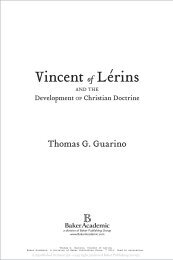stoicism in early christianity - Baker Publishing Group
stoicism in early christianity - Baker Publishing Group
stoicism in early christianity - Baker Publishing Group
You also want an ePaper? Increase the reach of your titles
YUMPU automatically turns print PDFs into web optimized ePapers that Google loves.
StoiciSm<br />
<strong>in</strong><br />
Early<br />
chriStianity<br />
Edited by<br />
Tuomas Rasimus,<br />
Troels Engberg-Pedersen,<br />
and Ismo Dunderberg<br />
K<br />
Tuomas Rasimus, Troels Engberg-Pedersen and Ismo Dunderberg, Stoicism <strong>in</strong> Early Christianity<br />
<strong>Baker</strong> Academic, a division of <strong>Baker</strong> Publish<strong>in</strong>g <strong>Group</strong>, © 2010. Used by permission.
Contents<br />
Preface vii<br />
Abbreviations ix<br />
1. Sett<strong>in</strong>g the Scene: Stoicism and Platonism <strong>in</strong> the Transitional Period<br />
<strong>in</strong> Ancient Philosophy 1<br />
Troels Engberg-Pedersen<br />
2. Stoicism as a Key to Paul<strong>in</strong>e Ethics <strong>in</strong> Romans 15<br />
Runar M. Thorste<strong>in</strong>sson<br />
3. Stoic Law <strong>in</strong> Paul? 39<br />
Niko Huttunen<br />
4. Jesus the Teacher and Stoic Ethics <strong>in</strong> the Gospel of Matthew 59<br />
Stanley K. Stowers<br />
5. An “Emotional” Jesus and Stoic Tradition 77<br />
Harold W. Attridge<br />
6. The Emotional Jesus: Anti-Stoicism <strong>in</strong> the Fourth Gospel? 93<br />
Gitte Buch-Hansen<br />
7. Stoic Physics, the Universal Conflagration, and the Eschatological<br />
Destruction of the “Ignorant and Unstable” <strong>in</strong> 2 Peter 115<br />
J. Albert Harrill<br />
8. The Stoics and the Early Christians on the Treatment of Slaves 141<br />
John T. Fitzgerald<br />
9. Fac<strong>in</strong>g the Beast: Just<strong>in</strong>, Christian Martyrdom, and Freedom of the Will 176<br />
Nicola Denzey<br />
Tuomas Rasimus, Troels Engberg-Pedersen and Ismo Dunderberg, Stoicism <strong>in</strong> Early Christianity<br />
<strong>Baker</strong> Academic, a division of <strong>Baker</strong> Publish<strong>in</strong>g <strong>Group</strong>, © 2010. Used by permission.
vi Stoicism <strong>in</strong> Early Christianity<br />
10. A Stoic Read<strong>in</strong>g of the Gospel of Mary: The Mean<strong>in</strong>g of “Matter” and<br />
“Nature” <strong>in</strong> Gospel of Mary 7.1–8.11 199<br />
Esther de Boer<br />
11. Stoic Traditions <strong>in</strong> the School of Valent<strong>in</strong>us 220<br />
Ismo Dunderberg<br />
12. Critical Reception of the Stoic Theory of Passions <strong>in</strong> the<br />
Apocryphon of John 239<br />
Takashi Onuki<br />
13. Stoic Ingredients <strong>in</strong> the Neoplatonic Be<strong>in</strong>g-Life-M<strong>in</strong>d Triad: An Orig<strong>in</strong>al<br />
Second-Century Gnostic Innovation? 257<br />
Tuomas Rasimus<br />
Index of Modern Authors 275<br />
Index of Subjects 281<br />
Index of Ancient Sources 288<br />
Tuomas Rasimus, Troels Engberg-Pedersen and Ismo Dunderberg, Stoicism <strong>in</strong> Early Christianity<br />
<strong>Baker</strong> Academic, a division of <strong>Baker</strong> Publish<strong>in</strong>g <strong>Group</strong>, © 2010. Used by permission.
Preface<br />
What was the earliest Christian <strong>in</strong>teraction with Greco-Roman philosophy<br />
like? And how <strong>early</strong> did it beg<strong>in</strong>? The story has often been told of the engagement<br />
with Middle Platonism of the Greek and Lat<strong>in</strong> church fathers up until Origen.<br />
Over the last few decades, however, attempts have been made to take the role<br />
of philosophy <strong>in</strong> <strong>early</strong> Christianity further back <strong>in</strong>to the first century. Here the<br />
potential role of Stoicism has also been variously explored. Faced with this new<br />
scholarly situation, the three editors of this volume decided that the time was ripe<br />
for an <strong>in</strong>vestigation <strong>in</strong>to the earliest Christianity and its relationship to Stoicism.<br />
The volume that has come out of this venture is exploratory <strong>in</strong> nature. In<br />
no way did we attempt to cover the whole field. The possible <strong>in</strong>teraction of Stoicism<br />
and Platonism <strong>in</strong> <strong>early</strong> Christian texts is also not a primary concern <strong>in</strong><br />
this volume. However, we wanted the volume to address the follow<strong>in</strong>g question<br />
head-on: To what extent are dist<strong>in</strong>ctly Stoic ideas useful for illum<strong>in</strong>at<strong>in</strong>g the<br />
mean<strong>in</strong>g of Christian texts from the first and second centuries? We suggest that<br />
<strong>early</strong> Christians—the authors of New Testament writ<strong>in</strong>gs, those of noncanonical<br />
<strong>early</strong> Christian writ<strong>in</strong>gs, and some <strong>early</strong> apologists—adopted philosophical<br />
ideas <strong>in</strong> the first and second centuries, and that it was specifically Stoicism that<br />
<strong>in</strong>fluenced their views, often to a degree greater than Middle Platonism. In this<br />
way, an entirely new light can be thrown on the relationship between philosophy<br />
and religion at the birth of Christianity.<br />
The essays are arranged <strong>in</strong> a roughly chronological order. After an <strong>in</strong>troductory<br />
chapter by Troels Engberg-Pedersen that sets the scene, there is, first, a series<br />
of essays on New Testament authors and Stoicism by Runar M. Thorste<strong>in</strong>sson (Romans),<br />
Niko Huttunen (Paul and the law), Stanley K. Stowers (Gospel of Matthew),<br />
Harold W. Attridge (Gospel of John), Gitte Buch-Hansen (Gospel of John), and<br />
J. Albert Harrill (2 Peter). Then follow essays by John T. Fitzgerald (Christians and<br />
Stoics on slavery) and Nicola Denzey (Stoics, Just<strong>in</strong>, and martyrdom). F<strong>in</strong>ally, the<br />
presence of Stoic ideas <strong>in</strong> other <strong>early</strong> Christian evidence from the second century<br />
is explored by Esther de Boer (Gospel of Mary), Ismo Dunderberg (Valent<strong>in</strong>ianism),<br />
Takashi Onuki (Apocryphon of John), and Tuomas Rasimus (Sethianism and<br />
Stoiciz<strong>in</strong>g Platonism).<br />
It rema<strong>in</strong>s to thank everybody <strong>in</strong>volved <strong>in</strong> br<strong>in</strong>g<strong>in</strong>g off this project, which<br />
began dur<strong>in</strong>g conversations at the Society of Biblical Literature annual meet<strong>in</strong>g <strong>in</strong><br />
Tuomas Rasimus, Troels Engberg-Pedersen and Ismo Dunderberg, Stoicism <strong>in</strong> Early Christianity<br />
<strong>Baker</strong> Academic, a division of <strong>Baker</strong> Publish<strong>in</strong>g <strong>Group</strong>, © 2010. Used by permission.
viii Stoicism <strong>in</strong> Early Christianity<br />
Wash<strong>in</strong>gton, D.C., <strong>in</strong> November 2006. In particular, we would like to thank each<br />
of the contributors, who not only accepted our <strong>in</strong>vitation to participate but also<br />
delivered what we were after. We would also like to thank Hendrickson Publishers,<br />
which has been uncommonly forthcom<strong>in</strong>g <strong>in</strong> the preparation of this project.<br />
F<strong>in</strong>ally, we wish to express our gratitude to Margot Stout Whit<strong>in</strong>g, who has helped<br />
improve the English of several non-English-speak<strong>in</strong>g contributors. It is our hope<br />
that this volume will help to strengthen a field of study where so much more rema<strong>in</strong>s<br />
to be done.<br />
Just before the publication of this volume, the editors heard of Esther de Boer’s<br />
premature and tragic death on July 6, 2010. We are grateful to be able to publish<br />
her essay here <strong>in</strong> her memory.<br />
Tuomas Rasimus<br />
Troels Engberg-Pedersen<br />
Ismo Dunderberg<br />
Tuomas Rasimus, Troels Engberg-Pedersen and Ismo Dunderberg, Stoicism <strong>in</strong> Early Christianity<br />
<strong>Baker</strong> Academic, a division of <strong>Baker</strong> Publish<strong>in</strong>g <strong>Group</strong>, © 2010. Used by permission.
Abbreviations<br />
Abr. De migratione Abrahami (On the Migration of Abraham)<br />
Abst. De abst<strong>in</strong>entia (On Abst<strong>in</strong>ence)<br />
Acad. post. Academica posteriora (The Later Academics)<br />
Adv. Ar. Adversus Arium (Aga<strong>in</strong>st Arius)<br />
Adv. haer. Adversus haereses (Aga<strong>in</strong>st Heresies)<br />
Aet. De aeternitate mundi (On the Eternity of the World)<br />
Agr. De agricultura (De re rustica) (Agriculture)<br />
Ann. Annales (Annals)<br />
ANRW Aufstieg und Niedergang der römischen Welt: Geschichte und<br />
Kultur Roms im Spiegel der neueren Forschung. Edited by<br />
H. Tempor<strong>in</strong>i and W. Haase. Berl<strong>in</strong>, 1972–<br />
Ant. Antiquitates judaicae (Jewish Antiquities)<br />
Anth. Anthologium (Anthology)<br />
Ap. John The Apocryphon of John<br />
Apol. Apologia (Apology)<br />
1 Apol. Apologia i (First Apology)<br />
2 Apol. Apologia ii (Second Apology)<br />
ASV American Standard Version<br />
BDAG Bauer, W., F. W. Danker, W. F. Arndt, and F. W. G<strong>in</strong>grich.<br />
Greek-English Lexicon of the New Testament and Other Early<br />
Christian Literature. 3d ed. Chicago, 1999<br />
Bell. civ. Bellum civile (Civil War)<br />
Ben. De beneficiis (On Favors)<br />
BG Berol<strong>in</strong>ensis Gnosticus (= Berl<strong>in</strong> Codex 8502)<br />
BGU Aegyptische Urkunden aus den Königlichen Staatlichen Museen<br />
zu Berl<strong>in</strong>, Griechische Urkunden. 15 vols. Berl<strong>in</strong>, 1895–1983<br />
Carn. Chr. De carne Christi (The Flesh of Christ)<br />
Cat. Maj. Cato Major (Cato the Elder)<br />
CCSL Corpus Christianorum: Series lat<strong>in</strong>a. Turnhout, 1953–<br />
Cels. Contra Celsum (Aga<strong>in</strong>st Celsus)<br />
Char. Characteres (Characters)<br />
Cher. De cherubim (On the Cherubim)<br />
CIL Corpus <strong>in</strong>scriptionum lat<strong>in</strong>arum. Leipzig and Berl<strong>in</strong>, 1893–<br />
Tuomas Rasimus, Troels Engberg-Pedersen and Ismo Dunderberg, Stoicism <strong>in</strong> Early Christianity<br />
<strong>Baker</strong> Academic, a division of <strong>Baker</strong> Publish<strong>in</strong>g <strong>Group</strong>, © 2010. Used by permission.
x Stoicism <strong>in</strong> Early Christianity<br />
Civ. De civitate Dei (The City of God)<br />
Claud. Divus Claudius (The Deified Claudius)<br />
CLE Carm<strong>in</strong>a lat<strong>in</strong>a epigraphica. F. Bücheler and E. Lommatzsch,<br />
eds. 3 vols. Leipzig, 1895–1926<br />
Clem. De clementia (On Clemency)<br />
Cohib. ira De cohibenda ira (On the Control of the Anger)<br />
Comm. not. De communibus notitiis contra Stoicos (On Common<br />
Conceptions)<br />
Comm. Phlm. Commentariorum <strong>in</strong> epistulam ad Philemonem liber<br />
(Commentary on Philemon)<br />
Comm. 1 Tim. Commentariorum <strong>in</strong> epistulam i ad Timotheum liber<br />
(Commentary on 1 Timothy)<br />
Conf. De confusione l<strong>in</strong>guarum (On the Confusion of Tongues)<br />
Congr. De congressu eruditionis gratia (On the Prelim<strong>in</strong>ary Studies)<br />
Const. De Constantia sapientiis (On Constancy)<br />
Cont. Controversiae (Controversies)<br />
CSEL Corpus scriptorum ecclesiasticorum lat<strong>in</strong>orum<br />
Deipn. Deipnosophistae (Philosophers at D<strong>in</strong>ner)<br />
De mens. De mensibus (On the Months)<br />
De pr<strong>in</strong>c. De pr<strong>in</strong>cipiis (On the First Pr<strong>in</strong>ciples)<br />
Deus Quod Deus sit immutabilis (That God Is Unchangeable)<br />
Dial. Dialogus cum Tryphone (Dialogue with Trypho)<br />
Diss. Dissertationes (Discourses)<br />
Ebr. De ebrietate (On Drunkenness)<br />
El. theol. Elementa theologiae (Elements of Theology)<br />
Ench. Encheiridion (Manual)<br />
Enn. Ennead<br />
Ep. Epistulae morales (Moral Epistles)<br />
Epict. diss. Epicteti dissertationes (Discourses of Epictetus)<br />
ET English translation<br />
Eth. nic. Ethica nichomachea (Nicomachean Ethics)<br />
Exc. Theod. Excerpta ex Theodoto (Excerpts from Theodotus)<br />
Ex. mart. Exhortatio ad martyrium (Exhortation to Martyrdom)<br />
Fat. De fato (On Fate)<br />
F<strong>in</strong>. De f<strong>in</strong>ibus (On Ends)<br />
Fuga De fuga et <strong>in</strong>ventione (On Flight and F<strong>in</strong>d<strong>in</strong>g)<br />
GCS Die griechischen christlichen Schriftsteller der ersten [drei]<br />
Jahrhunderte. Leipzig: H<strong>in</strong>richs, 1897–<br />
Gen. corr. De generatione et corruptione (Generation and Corruption)<br />
Gos. Mary The Gospel of Mary<br />
Gos. Phil. The Gospel of Philip<br />
Gos. Truth The Gospel of Truth<br />
Helv. Ad Helviam (To Helvia)<br />
Herc. fur. Hercules furens (The Madness of Hercules)<br />
Herc. Ot. Hercules Oetaeus (Hercules on Mount Oeta)<br />
Tuomas Rasimus, Troels Engberg-Pedersen and Ismo Dunderberg, Stoicism <strong>in</strong> Early Christianity<br />
<strong>Baker</strong> Academic, a division of <strong>Baker</strong> Publish<strong>in</strong>g <strong>Group</strong>, © 2010. Used by permission.
Abbreviations xi<br />
Hist. eccl. Historia ecclesiastica (Ecclesiastical History)<br />
Hist. phil. Historia philosophiae (History of Philosophy)<br />
Hist. Rom. Historia Romana (Roman History)<br />
Hom. Pseudo-Clement<strong>in</strong>e Homilies<br />
Hom. 1 Cor. Homiliae <strong>in</strong> epistulam i ad Cor<strong>in</strong>thios (Homilies on First<br />
Cor<strong>in</strong>thians)<br />
In Ar. Phys. In Aristotelis physica paraphrasis (On Aristotle’s Physics)<br />
In categ. In Aristotelis categorias commentarium (Commentary on<br />
Aristotle’s Categories)<br />
In Metaph. In Aristotelis Metaphysica commentaria (Commentary on<br />
Aristole’s Metaphysics)<br />
Interpr. Know. Interpretation of Knowledge<br />
In Tim. In Platonis Timaeum commentaria (Commentary on Plato’s<br />
Timaeus)<br />
Ira De ira (On Anger)<br />
L.A.E. Life of Adam and Eve<br />
Laps. De lapsis (The Lapsed)<br />
LCL Loeb Classical Library<br />
Leg. De legibus (On Laws)<br />
Leg. all. Legum allegoriae (Allegorical Interpretation)<br />
L-S Long, A. A., and D. N. Sedley. The Hellenistic Philosophers. 2<br />
vols. Cambridge, 1987<br />
LSJ Liddell, H. G., R. Scott, and H. S. Jones. A Greek-English<br />
Lexicon. 9th ed. with revised supplement. Oxford, 1996<br />
LXX Septuag<strong>in</strong>t<br />
Mand. Mandate<br />
Marc. Ad Marciam de consolatione (On Consolation to Marcia)<br />
Mart. Ad martyras (To the Martyrs)<br />
Mart. Pol. Martyrdom of Polycarp<br />
Math. Adversus mathematicos (Aga<strong>in</strong>st the Mathematicians)<br />
Mem. Memorabilia (Recollections)<br />
Metam. Metamorphoses<br />
Mixt. De mixtione (On Mixture)<br />
Mor. Moralia (Morals)<br />
Mos. De vita Mosis (On the Life of Moses)<br />
MT Masoretic Text<br />
Mur. Pro Murena (For Lucius Murena)<br />
Nat. Naturales quaestiones (Natural Questions)<br />
Nat. d. De natura deorum (The Nature of the Gods)<br />
Nat. hist. Naturalis historia (Natural History)<br />
Nat. hom. De natura hom<strong>in</strong>is (On the Nature of Man)<br />
NHC Nag Hammadi Codex<br />
NIV New International Version<br />
NJPS Tanakh: The Holy Scriptures: The New JPS Translation accord<strong>in</strong>g<br />
to the Traditional Hebrew Text<br />
Tuomas Rasimus, Troels Engberg-Pedersen and Ismo Dunderberg, Stoicism <strong>in</strong> Early Christianity<br />
<strong>Baker</strong> Academic, a division of <strong>Baker</strong> Publish<strong>in</strong>g <strong>Group</strong>, © 2010. Used by permission.
xii Stoicism <strong>in</strong> Early Christianity<br />
Noct. att. Noctes atticae (Attic Nights)<br />
NRSV New Revised Standard Version<br />
Oct. Octavius<br />
Oec. Oeconomicus (The Economist)<br />
Off. De officiis (On Duties)<br />
Opif. De opificio mundi (On the Creation of the World)<br />
Otio De otio (On Leisure)<br />
OTP Old Testament Pseudepigrapha. Edited by J. H. Charlesworth. 2<br />
vols. New York, 1983<br />
Pan. Panarion (Medic<strong>in</strong>e Chest)<br />
Perpetua Passion of Perpetua<br />
PG Patrologia graeca [= Patrologiae cursus completus: Series<br />
graeca]. Edited by J.-P. Migne. 162 vols. Paris, 1857–1886<br />
Phaedr. Phaedrus<br />
Philops. Philopseudes (The Lover of Lies)<br />
PHP De placitis Hippocratis et Platonis (On the Doctr<strong>in</strong>es of<br />
Hippocrates and Plato)<br />
Plant. De plantatione (On Plant<strong>in</strong>g)<br />
Plat. Theol. Theologia Platonica (Platonic Theology)<br />
P.Lond. Greek Papyri <strong>in</strong> the London Museum<br />
Pol. Politica (Politics)<br />
Polyb. Ad Polybium de consolatione (To Polybius on Consolation)<br />
P.Oxy. Oxyrhynchus Papyri<br />
Praep. ev. Praeparatio evangelica (Preparation for the Gospel)<br />
Pr<strong>in</strong>c. De pr<strong>in</strong>cipiis (First Pr<strong>in</strong>ciples)<br />
Prov. De providentia (On Providence)<br />
P.Ryl. Greek and Lat<strong>in</strong> Papyri <strong>in</strong> the John Rylands Library<br />
Pyr. Pyrrhoniae hypotyposes (Outl<strong>in</strong>es of Pyrrhonism)<br />
Pyrrh. Pyrrhus (Life of Pyrrhus)<br />
QE Quaestiones et solutiones <strong>in</strong> Exodum (Questions and Answers on<br />
Exodus)<br />
QG Quaestiones et solutiones <strong>in</strong> Genes<strong>in</strong> (Questions and Answers on<br />
Genesis)<br />
Rec. Pseudo-Clement<strong>in</strong>e Recognitions<br />
Ref. Refutatio omnium haeresium (Refutation of All Heresies)<br />
Rep. Republic<br />
Resp. De republica (On the State)<br />
Saty. Satyricon<br />
SC Sources chrétiennes. Paris: Cerf. 1943–<br />
Sent. Sententiae ad <strong>in</strong>telligibilia ducentes (Sentences)<br />
Sib. Or. Sibyll<strong>in</strong>e Oracles<br />
Somn. De somniis (On Dreams)<br />
Spec. De specialibus legibus (On the Special Laws)<br />
Spect. De spectaculis (The Shows)<br />
Steles Seth The Three Steles of Seth<br />
Tuomas Rasimus, Troels Engberg-Pedersen and Ismo Dunderberg, Stoicism <strong>in</strong> Early Christianity<br />
<strong>Baker</strong> Academic, a division of <strong>Baker</strong> Publish<strong>in</strong>g <strong>Group</strong>, © 2010. Used by permission.
Abbreviations xiii<br />
Stoic. rep. De Stoicorum repugnatiis (On Stoic Self-contradictions)<br />
Strom. Stromata (Miscellanies)<br />
SVF Stoicorum veterum fragmenta. H. von Arnim. 4 vols. Leipzig,<br />
1903–1924<br />
T. Dan Testament of Dan<br />
Tim. Timaeus<br />
T. Job Testament of Job<br />
TNIV Today’s New International Version<br />
Tranq. De tranquillitate animi (On the Tranquility of M<strong>in</strong>d)<br />
Tri. Trac. The Tripartite Tractate<br />
Tusc. Tusculanae disputationes (Tusculan Disputations)<br />
Virt. De virtutibus (On Virtues)<br />
Virt. mor. De virtute morali (On Moral Virtue)<br />
Vit. auct. Vitarum auctio (Philosophies for Sale)<br />
Vit. beat. De vita beata (On the Happy Life)<br />
Vit. phil. Vitae philosophorum (Lives of Em<strong>in</strong>ent Philosophers)<br />
Vit. Plot. Vita Plot<strong>in</strong>i (Life of Plot<strong>in</strong>us)<br />
W-H Wachsmuth, C. and O. Hense. 1974–1975. Ioannis Stobaei:<br />
Anthologium. 3d ed. 5 vols. Berl<strong>in</strong>: Weidmann<br />
Tuomas Rasimus, Troels Engberg-Pedersen and Ismo Dunderberg, Stoicism <strong>in</strong> Early Christianity<br />
<strong>Baker</strong> Academic, a division of <strong>Baker</strong> Publish<strong>in</strong>g <strong>Group</strong>, © 2010. Used by permission.
Tuomas Rasimus, Troels Engberg-Pedersen and Ismo Dunderberg, Stoicism <strong>in</strong> Early Christianity<br />
<strong>Baker</strong> Academic, a division of <strong>Baker</strong> Publish<strong>in</strong>g <strong>Group</strong>, © 2010. Used by permission.
1<br />
Sett<strong>in</strong>g the Scene: Stoicism and<br />
Platonism <strong>in</strong> the Transitional<br />
Period <strong>in</strong> Ancient Philosophy<br />
Troels Engberg-Pedersen<br />
University of Copenhagen<br />
The centuries immediately follow<strong>in</strong>g the end of the Hellenistic age rema<strong>in</strong> a murky<br />
area <strong>in</strong> the history of philosophy. While a great deal of work has been done <strong>in</strong> recent<br />
years to rehabilitate Hellenistic thought itself from the generally negative assessment<br />
of the n<strong>in</strong>eteenth century, the thesis that later philosophy traces a decl<strong>in</strong>e <strong>in</strong>to “eclecticism”<br />
. . . reta<strong>in</strong>s a programmatic hold over studies of the period. Three centuries of<br />
<strong>in</strong>tellectual activity are held to mark out a k<strong>in</strong>d of philosophical no man’s land between<br />
the earlier systems from which they are taken to derive their material, and the glories<br />
of “Neoplatonism” to which they look forward.<br />
Thus George Boys-Stones began his <strong>in</strong>trigu<strong>in</strong>g book from 2001, Post-Hellenistic<br />
Philosophy, subtitled A Study of Its Development from the Stoics to Origen. 1 The period<br />
that he identified <strong>in</strong> this way was roughly 100 b.c.e.–200 c.e. This was also<br />
the period <strong>in</strong> which Greco-Roman philosophy began to make a serious impact on<br />
Jewish and <strong>early</strong> Christian th<strong>in</strong>k<strong>in</strong>g, as is documented by the essays <strong>in</strong> this book.<br />
In this <strong>in</strong>troductory essay I will present some of the ma<strong>in</strong> features of this period,<br />
focus<strong>in</strong>g on the <strong>in</strong>teraction between the various philosophical schools and try<strong>in</strong>g<br />
to understand the precise character of that <strong>in</strong>teraction. S<strong>in</strong>ce at the beg<strong>in</strong>n<strong>in</strong>g of<br />
the period Stoicism was the lead<strong>in</strong>g philosophical school but had been displaced<br />
as such at the end of the period by Platonism, I will also focus on try<strong>in</strong>g to understand<br />
the development that resulted <strong>in</strong> this change. Traditionally, the period has<br />
been studied—at least by scholars <strong>in</strong>terested <strong>in</strong> Platonism and its impact on Jewish<br />
and <strong>early</strong> Christian th<strong>in</strong>k<strong>in</strong>g—under the rubric “Middle Platonism.” 2 Scholars<br />
have identified two forms of Stoicism <strong>in</strong> it: so-called Middle Stoicism for the hundred<br />
years runn<strong>in</strong>g approximately from 150 b.c.e. to 50 b.c.e. and so-called Late<br />
1 Boys-Stones 2001, v.<br />
2 The classic treatment is Dillon 1996b.<br />
Tuomas Rasimus, Troels Engberg-Pedersen and Ismo Dunderberg, Stoicism <strong>in</strong> Early Christianity<br />
<strong>Baker</strong> Academic, a division of <strong>Baker</strong> Publish<strong>in</strong>g <strong>Group</strong>, © 2010. Used by permission.
2 Stoicism <strong>in</strong> Early Christianity<br />
Stoicism or Neo<strong>stoicism</strong> for the two first centuries c.e. 3 However, for the purposes<br />
of understand<strong>in</strong>g both the <strong>in</strong>teraction between Stoicism and Platonism (and <strong>in</strong><br />
pr<strong>in</strong>ciple other philosophies) <strong>in</strong> the whole period and also the relationship of either<br />
with <strong>early</strong> Jewish and Christian thought, it is preferable to identify the period,<br />
as is proposed here, as the “Transitional Period” of ancient philosophy. 4<br />
1. Basic Changes Dur<strong>in</strong>g the Transitional Period<br />
A number of momentous events directly relevant to the development of<br />
philosophy took place dur<strong>in</strong>g the Transitional Period <strong>in</strong> the political and more<br />
broadly cultural fields of the ancient world. 5 While philosophy previously had<br />
been someth<strong>in</strong>g of a Greek specialty focused on Athens, the Romans now began<br />
to make their presence felt. In Greece itself, the first representative of Middle Stoicism,<br />
Panaetius of Rhodes (ca. 185–109 b.c.e.), who had stayed <strong>in</strong> Rome <strong>in</strong> the<br />
140s, ma<strong>in</strong>ta<strong>in</strong>ed close contacts with high-level Romans when he became head<br />
of the Stoic school <strong>in</strong> Athens from 129 until his death. Even more importantly,<br />
as a result of the so-called First Mithradatic War (89–85), <strong>in</strong> which Athens had<br />
sided with K<strong>in</strong>g Mithradates of Pontus <strong>in</strong> Asia M<strong>in</strong>or aga<strong>in</strong>st the Romans, the four<br />
schools of philosophy that had been operat<strong>in</strong>g <strong>in</strong> Athens s<strong>in</strong>ce the beg<strong>in</strong>n<strong>in</strong>g of<br />
the Hellenistic period were closed down by the Romans after Sulla had captured<br />
the city <strong>in</strong> the year 86. Philosophy now became homeless and had to go <strong>in</strong>to exile.<br />
Even before that, however, the second ma<strong>in</strong> representative of Middle Stoicism,<br />
Posidonius of Apamea (ca. 135–51), who had studied with Panaetius at Athens,<br />
founded his own school of Stoicism <strong>in</strong> Rhodes. Posidonius, too, had close contacts<br />
with high-level Romans. In short, Athens was no longer the center of philosophy.<br />
In Rome itself, the new superpower made itself felt <strong>in</strong> several ways <strong>in</strong> relation<br />
to philosophy. Around 50 b.c.e., Cicero wrote philosophical treatises on the ma<strong>in</strong><br />
topics <strong>in</strong> philosophy—epistemology, physics and theology, ethics—<strong>in</strong> which he set<br />
forth the ma<strong>in</strong> positions adopted by the three schools that were recognized as the<br />
most important ones at the end of the Hellenistic period: Stoicism, Epicureanism,<br />
and the skeptical “New Academy” (which had developed the nondogmatic side<br />
of Plato’s philosophy), though also with some <strong>in</strong>put from the Peripatetic school<br />
derived from Aristotle. 6 Two editorial undertak<strong>in</strong>gs had immense <strong>in</strong>fluence on<br />
the further development of philosophy. Sometime around the mid-first century<br />
b.c.e. <strong>in</strong> Rome, Andronicus of Rhodes produced an edition of Aristotle’s works,<br />
3 For excellent overviews, see Sedley 2003 and Gill 2003, respectively.<br />
4 Compare at least the title of Berchman 1984, From Philo to Origen: Middle Platonism<br />
<strong>in</strong> Transition.<br />
5 S<strong>in</strong>ce it is not my aim <strong>in</strong> what follows to discuss each <strong>in</strong>dividual person or event that<br />
is mentioned, I have refra<strong>in</strong>ed from giv<strong>in</strong>g detailed references for the underly<strong>in</strong>g evidence.<br />
Many of those references may be found <strong>in</strong>, for <strong>in</strong>stance, André 1987; Gill 2003; Sedley 2003.<br />
6 The most important among these treatises are Academica (epistemology), De F<strong>in</strong>ibus<br />
Bonorum et Malorum (ethics), Tusculan Disputations (moral psychology), and De Natura<br />
Deorum (ontology and theology).<br />
Tuomas Rasimus, Troels Engberg-Pedersen and Ismo Dunderberg, Stoicism <strong>in</strong> Early Christianity<br />
<strong>Baker</strong> Academic, a division of <strong>Baker</strong> Publish<strong>in</strong>g <strong>Group</strong>, © 2010. Used by permission.
<strong>in</strong>clud<strong>in</strong>g the so-called esoteric ones, which are those that have come down to<br />
us and that were to make a huge impact on philosophiz<strong>in</strong>g <strong>in</strong> the centuries to<br />
come. About seventy-five years later, the court astrologer of the emperor Tiberius<br />
<strong>in</strong> Rome, Tiberius Claudius Thrasyllus (who notably came from Alexandria), produced<br />
what was probably a new edition of Plato’s writ<strong>in</strong>gs, <strong>in</strong> which he apparently<br />
<strong>in</strong>troduced the division of the dialogues <strong>in</strong>to tetralogies that is still <strong>in</strong> use.<br />
Back <strong>in</strong> the first century b.c.e., Alexandria <strong>in</strong> Egypt had come <strong>in</strong>to its own as a<br />
place where dogmatic, nonskeptical Platonism began to develop <strong>in</strong>to Middle Platonism.<br />
Eudorus of Alexandria, who flourished around 25 b.c.e., “seems to have<br />
turned the very Stoicized Platonism of [the dogmatic apostate from the nondogmatic<br />
Platonic New Academy] Antiochus of Ascalon <strong>in</strong> a more transcendental<br />
direction, under the <strong>in</strong>fluence of Neopythagoreanism.” 7 This statement made by<br />
an authority on Middle Platonism, John Dillon, po<strong>in</strong>ts to our theme: the relationship<br />
between Stoicism <strong>in</strong> the Transitional Period and a newly conceived Platonism,<br />
which eventually led to the f<strong>in</strong>al victory of Platonism over Stoicism both<br />
<strong>in</strong> Neoplatonism (third century) and <strong>in</strong> Christian thought that is contemporary<br />
with Neoplatonism. Witnesses to this victory are two more, later and Christian<br />
Alexandrians: Clement of Alexandria (ca. 150–215 c.e.) and the great Origen<br />
(184/185–254/255 c.e.). But <strong>in</strong>to this development we should also fit yet another<br />
Alexandrian (on whom Clement drew heavily): the Jewish Platonist Philo of Alexandria,<br />
back around the birth of Christ (ca. 20 b.c.e.–45 c.e.), who played an<br />
important, if somewhat enigmatic, role <strong>in</strong> the development of Middle Platonism. 8<br />
Dillon’s comment also po<strong>in</strong>ts to the elusive role played at the beg<strong>in</strong>n<strong>in</strong>g of this<br />
whole development by the “new Academician turned Stoic” Antiochus of Ascalon<br />
(ca. 130–69/68 b.c.e.), who had studied <strong>in</strong> Athens with the last representative of<br />
the New Academy, Philo of Larissa (159/158–84/83 b.c.e.), had then founded his<br />
own school <strong>in</strong> the same city, but also ma<strong>in</strong>ta<strong>in</strong>ed extensive contacts with highlevel<br />
Romans <strong>in</strong> whose company he even visited Alexandria. We will come back<br />
later to Antiochus, who is a characteristic representative at an <strong>early</strong> stage of the<br />
change <strong>in</strong> the relationship between Stoicism and Platonism that we will consider.<br />
What we have, then, is a move away from Athens as the philosophical center to<br />
Rhodes, Alexandria, and Rome; a summary by Cicero <strong>in</strong> Rome around 50 b.c.e. of<br />
Hellenistic philosophy as it more or less appeared before the developments that <strong>in</strong>augurated<br />
the Transitional Period (though Cicero does make relatively much of the novelties<br />
<strong>in</strong>troduced by Antiochus of Ascalon); 9 developments <strong>in</strong> Alexandria throughout<br />
the first century b.c.e. that contributed to creat<strong>in</strong>g the form of Platonism known by<br />
modern scholars as Middle Platonism (and here we may specifically note the extensive<br />
amount of Platonism to be found <strong>in</strong> the Jewish philosopher Philo of Alexandria);<br />
and f<strong>in</strong>ally, the fact of major editorial undertak<strong>in</strong>gs <strong>in</strong> Rome of the writ<strong>in</strong>gs of Aristo-<br />
7 Dillon 1996a.<br />
8 John Dillon’s perceptive discussion of Philo (Dillon 1996b, 139–83) shows the extent to<br />
which Philo was <strong>in</strong>fluenced by Alexandrian Platonism. His <strong>in</strong>fluence on later Platonists seems<br />
to have been negligible, however, until one reaches the Christian Clement of Alexandria.<br />
9 This comes out very cl<strong>early</strong> <strong>in</strong> the excellent overview of Antiochus <strong>in</strong> Dillon 1996b,<br />
52–106.<br />
Sett<strong>in</strong>g the Scene: Stoicism and Platonism <strong>in</strong> the Transitional Period <strong>in</strong> Ancient Philosophy 3<br />
Tuomas Rasimus, Troels Engberg-Pedersen and Ismo Dunderberg, Stoicism <strong>in</strong> Early Christianity<br />
<strong>Baker</strong> Academic, a division of <strong>Baker</strong> Publish<strong>in</strong>g <strong>Group</strong>, © 2010. Used by permission.
4 Stoicism <strong>in</strong> Early Christianity<br />
tle and of Plato. Even as described <strong>in</strong> these broadly cultural terms, philosophy looked<br />
very different <strong>in</strong> the first century b.c.e. compared to previous centuries.<br />
The changes <strong>in</strong> the social practices of do<strong>in</strong>g philosophy that took place dur<strong>in</strong>g<br />
the first century b.c.e. and were quite often <strong>in</strong> one way or another connected<br />
with the presence of the Romans laid the ground for a period that runs to the end of<br />
the second century c.e. Dur<strong>in</strong>g this period, the development <strong>in</strong> philosophy gradually<br />
changed the overall philosophical landscape rather drastically. Both Epicureanism<br />
and Stoicism were still around dur<strong>in</strong>g the whole period, the latter <strong>in</strong> the<br />
form of Late Stoicism or Neo<strong>stoicism</strong> as represented by, among others, the Roman<br />
philosopher and statesman Seneca (ca. 1–65 c.e.); the Roman knight (who wrote <strong>in</strong><br />
Greek) Musonius Rufus (ca. 30–100); the Roman (but orig<strong>in</strong>ally Greek) slave (who<br />
also taught <strong>in</strong> Greek) Epictetus (ca. 50–120); and f<strong>in</strong>ally the Roman emperor Marcus<br />
Aurelius (121–180), who also wrote <strong>in</strong> Greek. But alongside these two schools,<br />
Aristotelianism (the Peripatetics) came <strong>in</strong>to its own as a very important <strong>in</strong>tellectual<br />
presence <strong>in</strong> philosophy, as is witnessed by the extensive amount of commentaries<br />
that began to be written on Aristotle’s texts—for <strong>in</strong>stance, by the great Alexander of<br />
Aphrodisias (ca. 200 c.e.). Similarly, Platonism <strong>in</strong> the new form that it had achieved<br />
dur<strong>in</strong>g the first century b.c.e. eventually became the reign<strong>in</strong>g type of philosophy,<br />
which would then also, from the latter half of the second century onwards, exercise<br />
a profound <strong>in</strong>fluence on Christian theologians such as the Christian Alexandrians<br />
noted earlier. This is the period of a number of ma<strong>in</strong> representatives of Middle Platonism:<br />
Plutarch (ca. 50–120) and a number of figures from the second century c.e.<br />
such as Alb<strong>in</strong>us (ca. 150), Alc<strong>in</strong>ous (second century), Apuleius (ca. 125–170), Atticus<br />
(ca. 150–200), and Numenius (second century). At a specific po<strong>in</strong>t <strong>in</strong> time at<br />
the end of the Transitional Period, <strong>in</strong> 178 c.e., the emperor Marcus Aurelius sealed<br />
the <strong>in</strong>terven<strong>in</strong>g development by sett<strong>in</strong>g up four new chairs of philosophy <strong>in</strong> Athens,<br />
which thereby reasserted—if not <strong>in</strong> actual fact, at least <strong>in</strong> appearance—the role it<br />
had had until the Romans closed the schools <strong>in</strong> 86 b.c.e. Where Cicero had focused<br />
on three philosophies—Epicureanism, Stoicism, and the skeptical New Academy<br />
(though also with some <strong>in</strong>put from specifically Aristotelian philosophy)—Marcus<br />
Aurelius now <strong>in</strong>stalled chairs for the four philosophies that were henceforth to be<br />
the four philosophies of the ancient world: Epicureanism, Stoicism, Aristotelianism,<br />
and dogmatic Platonism. However, and most importantly, by this time both<br />
Epicureanism and Stoicism were for all <strong>in</strong>tents and purposes basically ext<strong>in</strong>ct, only<br />
to be rediscovered at a far later period <strong>in</strong> the history of European thought, after the<br />
Renaissance. The two philosophies that were alive and <strong>in</strong>fluential were Aristotelianism<br />
and Platonism, with the latter be<strong>in</strong>g the lead<strong>in</strong>g force.<br />
2. The Problem<br />
With this brief overview <strong>in</strong> place, we may raise the question of a deeper understand<strong>in</strong>g<br />
of some of the changes noted above. One th<strong>in</strong>g particularly strik<strong>in</strong>g<br />
about the Transitional Period is that almost all philosophers with<strong>in</strong> the period to<br />
some degree adopted ideas from philosophies other than their own. In the con-<br />
Tuomas Rasimus, Troels Engberg-Pedersen and Ismo Dunderberg, Stoicism <strong>in</strong> Early Christianity<br />
<strong>Baker</strong> Academic, a division of <strong>Baker</strong> Publish<strong>in</strong>g <strong>Group</strong>, © 2010. Used by permission.
Sett<strong>in</strong>g the Scene: Stoicism and Platonism <strong>in</strong> the Transitional Period <strong>in</strong> Ancient Philosophy 5<br />
text of the present book and the overall change from Stoicism to Platonism as the<br />
lead<strong>in</strong>g force, we will focus particularly on these two schools. What we f<strong>in</strong>d is that<br />
many philosophers who were basically Stoics, and who saw themselves as such,<br />
also drew on ideas that had a specifically Platonic pedigree. Conversely, many philosophers<br />
who were basically Platonists, and who saw themselves as such, also<br />
drew on ideas that had a specifically Stoic pedigree. Traditionally, as Boys-Stones<br />
noted <strong>in</strong> the quotation with which we began, this phenomenon has been identified<br />
as a matter of “eclecticism.” More recently, however, this category has been called<br />
seriously <strong>in</strong>to question. 10 As John Dillon concludes his analysis of the phenomenon,<br />
“Eclecticism has for too long been used as a term of contempt <strong>in</strong> the area of<br />
later Greek philosophy. As such, let us have done with it.” 11 But then, how should<br />
we understand the fact itself of the existence of various types of blend<strong>in</strong>g of philosophies<br />
<strong>in</strong> our period? For of course, the fact itself does not go away by call<strong>in</strong>g<br />
<strong>in</strong>to question our way of categoriz<strong>in</strong>g it.<br />
This question becomes even more serious when one notes that the very same<br />
philosophers who <strong>in</strong> this or the other area engaged <strong>in</strong> a blend<strong>in</strong>g exercise also<br />
quite often had very strong op<strong>in</strong>ions about the <strong>in</strong>adequacy of the philosophy as<br />
a whole from which they nevertheless drew certa<strong>in</strong> ideas. At least, while there is<br />
a certa<strong>in</strong> openness toward <strong>in</strong>put from Plato, as we will see, <strong>in</strong> certa<strong>in</strong> Stoics dur<strong>in</strong>g<br />
our period (beg<strong>in</strong>n<strong>in</strong>g with Panaetius and extend<strong>in</strong>g from him over Posidonius<br />
and Seneca to Marcus Aurelius), the Platonists, on their side, wrote explicitly<br />
aga<strong>in</strong>st Stoicism while also adopt<strong>in</strong>g Stoic ideas <strong>in</strong> a number of places. How is that<br />
apparent paradox to be understood and expla<strong>in</strong>ed? Can we f<strong>in</strong>d a way of understand<strong>in</strong>g<br />
the character of philosophy itself <strong>in</strong> our period that will also expla<strong>in</strong> and<br />
dissolve the paradox?<br />
Before address<strong>in</strong>g this question, we should note that the question is directly<br />
relevant to the issue be<strong>in</strong>g discussed <strong>in</strong> the present book. It is well known, and<br />
we have already noted the fact, that from a certa<strong>in</strong> po<strong>in</strong>t <strong>in</strong> time onward, namely,<br />
toward the end of the second century c.e., the k<strong>in</strong>d of philosophy that <strong>in</strong>fluenced<br />
Christian thought was basically that of Platonism. Before that, however, the situation<br />
was far less clear-cut. In <strong>early</strong> Christian texts from the New Testament and<br />
well <strong>in</strong>to the second century, one may <strong>in</strong> fact f<strong>in</strong>d traces of Platonism. But one may<br />
also f<strong>in</strong>d traces of Stoicism. Indeed, some (<strong>in</strong>clud<strong>in</strong>g the writer of these pages)<br />
have argued that at least <strong>in</strong> the thought of the apostle Paul the Stoic component<br />
is far more extensive than normally admitted. 12 But then, s<strong>in</strong>ce no <strong>early</strong> Christian<br />
writer was either a Platonist or a Stoic per se (rather, they had their own worldview,<br />
focused on Christ), how should one understand this adoption of either Platonic<br />
or Stoic ideas? And <strong>in</strong>deed, how may one and the same Christian writer adopt<br />
both Platonic and Stoic ideas if that is <strong>in</strong> fact the case? In order to answer these<br />
questions we must obta<strong>in</strong> a better grasp of the <strong>in</strong>teraction between Platonism and<br />
Stoicism dur<strong>in</strong>g our period <strong>in</strong> philosophy proper, outside the Christian context.<br />
10 The classic discussion is Dillon and Long 1988.<br />
11 Dillon 1988, 125.<br />
12 See Engberg-Pedersen 2000.<br />
Tuomas Rasimus, Troels Engberg-Pedersen and Ismo Dunderberg, Stoicism <strong>in</strong> Early Christianity<br />
<strong>Baker</strong> Academic, a division of <strong>Baker</strong> Publish<strong>in</strong>g <strong>Group</strong>, © 2010. Used by permission.
6 Stoicism <strong>in</strong> Early Christianity<br />
3. Attempts at a Solution<br />
Important steps have been taken <strong>in</strong> recent scholarship to f<strong>in</strong>d a solution to the<br />
apparent paradox of the copresence of, for <strong>in</strong>stance, Platonism and Stoicism <strong>in</strong> philosophers<br />
who saw themselves as belong<strong>in</strong>g to one of the two schools only and were<br />
even highly critical of the school from which they did <strong>in</strong>corporate certa<strong>in</strong> ideas.<br />
In his excellent overview of “Les écoles philosophiques aux deux premiers siècles<br />
de l’Empire,” Jean-Marie André spoke of a “cultural <strong>in</strong>tegration” of the philosophical<br />
schools <strong>in</strong>to society <strong>in</strong> the way their dogmatic positions had become part<br />
of “the encyclopedia of antiquity.” 13 That expla<strong>in</strong>s Marcus Aurelius’s <strong>in</strong>stallation<br />
of the four chairs of philosophy at the end of our period, but hardly the blend<strong>in</strong>g<br />
exercise that also took place throughout the period. More recently, <strong>in</strong> an epilogue<br />
to the Cambridge History of Hellenistic Philosophy, Michael Frede focused, <strong>in</strong> a<br />
manner that I have basically adopted above, on the change <strong>in</strong> the role of Athens<br />
at the beg<strong>in</strong>n<strong>in</strong>g of our period, which saw what David Sedley has also called “the<br />
great philosophical exodus from Athens” around 86 b.c.e. 14 When the Athenian<br />
schools went out of existence, says Frede, there was no longer any “scholarch to<br />
def<strong>in</strong>e the philosophical position of the school. It was no longer relatively clear<br />
what the position of a school was on a particular question at a particular time.” 15<br />
“This vagueness and <strong>in</strong>def<strong>in</strong>iteness about what it is to belong to a certa<strong>in</strong> school<br />
must have re<strong>in</strong>forced greatly the process by which the founders of a school turned<br />
<strong>in</strong>to authorities and their writ<strong>in</strong>gs became authoritative texts that to some extent<br />
def<strong>in</strong>ed the school.” 16 The importance of Frede’s emphasis on the turn toward “authoritative<br />
texts” as a characteristic feature of our period can hardly be overstated.<br />
But aga<strong>in</strong>, while it certa<strong>in</strong>ly adds to one’s understand<strong>in</strong>g of the ossification of the<br />
four philosophical schools with their four authoritative found<strong>in</strong>g fathers, the turn<br />
does not, of course, expla<strong>in</strong> the blend<strong>in</strong>g exercise that gave rise to the old characterization<br />
of our period as one of eclecticism.<br />
In a more recent study, David Sedley, who has long been work<strong>in</strong>g on the character<br />
of philosophy itself <strong>in</strong> the Hellenistic period, has developed Frede’s picture<br />
further by speak<strong>in</strong>g of a “new pattern of philosophical teach<strong>in</strong>g” aris<strong>in</strong>g from the<br />
demise of the Athenian schools, a pattern that <strong>in</strong>volved “the scholarly study of<br />
school texts” as a way of “recover<strong>in</strong>g, understand<strong>in</strong>g, and liv<strong>in</strong>g the wisdom of the<br />
ancients.” 17 But Sedley also suggests a way of understand<strong>in</strong>g the other side of the<br />
paradox <strong>in</strong> his remarks about the ma<strong>in</strong> representatives of Middle Stoicism, Panaetius<br />
and Posidonius. Although these two philosophers, Sedley argues, belonged<br />
“firmly with<strong>in</strong> the ma<strong>in</strong> current of Stoic debate” (i.e., they were Stoics), they also<br />
“made regular use of <strong>early</strong> Peripatetic as well as Platonist writ<strong>in</strong>gs,” 18 thereby br<strong>in</strong>g-<br />
13 André 1987, 75.<br />
14 Sedley 2003, 27.<br />
15 Frede 2005, 792.<br />
16 Ibid., 793 (my italics).<br />
17 Sedley 2003, 29. Sedley’s earlier work that I h<strong>in</strong>ted at is Sedley 1989.<br />
18 Ibid., 24.<br />
Tuomas Rasimus, Troels Engberg-Pedersen and Ismo Dunderberg, Stoicism <strong>in</strong> Early Christianity<br />
<strong>Baker</strong> Academic, a division of <strong>Baker</strong> Publish<strong>in</strong>g <strong>Group</strong>, © 2010. Used by permission.
Sett<strong>in</strong>g the Scene: Stoicism and Platonism <strong>in</strong> the Transitional Period <strong>in</strong> Ancient Philosophy 7<br />
<strong>in</strong>g about a “pool<strong>in</strong>g of philosophical resources among what could be seen as<br />
three branches of the Platonist tradition: <strong>early</strong> Platonism, Aristotelianism, and<br />
Stoicism.” 19 Sedley also speaks of this strategy as be<strong>in</strong>g one of “syncretism,” but<br />
what he actually shows is that such syncretism should be understood not as an act<br />
of blend<strong>in</strong>g or br<strong>in</strong>g<strong>in</strong>g ideas together <strong>in</strong> a great melt<strong>in</strong>g pot, but <strong>in</strong> a rather more<br />
specific manner as a strategy of “reclaim<strong>in</strong>g” or “absorb<strong>in</strong>g” ideas from a philosophy<br />
other than one’s own <strong>in</strong>to one’s own philosophy. The syncretism does not erase<br />
the differences between any two philosophies. Nor does it <strong>in</strong> any way imply that a<br />
given philosopher is no longer either a Stoic or a Platonist (or aga<strong>in</strong>, a Christian).<br />
On the contrary, it is precisely while be<strong>in</strong>g either this or that that one may also<br />
“reclaim” or “absorb” foreign ideas <strong>in</strong>to one’s own philosophy.<br />
If Panaetius and Posidonius are <strong>in</strong> this way an example of Stoics who also<br />
“syncretized” certa<strong>in</strong> Platonic ideas <strong>in</strong>to their own Stoicism, Sedley shows how<br />
Posidonius’s contemporary Antiochus of Ascalon, whom I mentioned earlier, fits<br />
the opposite bill of be<strong>in</strong>g a Platonist who <strong>in</strong>corporated a huge amount of Stoicism<br />
<strong>in</strong>to what he himself took to be the authentic form of Platonism. Antiochus’s case<br />
is <strong>in</strong>trigu<strong>in</strong>g <strong>in</strong> a number of ways. 20 His position constituted a break with the skeptical<br />
New Academy of his teacher Philo of Larissa, a break that Antiochus marked<br />
by speak<strong>in</strong>g of his own position as articulat<strong>in</strong>g that of the “Old Academy.” In itself,<br />
that move is perhaps not so surpris<strong>in</strong>g, s<strong>in</strong>ce epistemological and ontological<br />
skepticism surely does not cover everyth<strong>in</strong>g to be found <strong>in</strong> Plato. What is more<br />
surpris<strong>in</strong>g is that, apparently, Antiochus took over from the Stoics a number of<br />
ideas <strong>in</strong> physics that the Stoics themselves had articulated <strong>in</strong> direct opposition to<br />
Aristotelianism and Platonism. When Antiochus <strong>in</strong>sisted, on the basis of his contention<br />
that “the doctr<strong>in</strong>es of the Stoics were present already <strong>in</strong> Plato,” 21 that talk<br />
of an immaterial substance (like the Platonic ideas) was “un<strong>in</strong>telligible,” and that<br />
he saw “no possibility . . . of anyth<strong>in</strong>g immaterial, transcendent or external to the<br />
material universe,” 22 then certa<strong>in</strong>ly he was tak<strong>in</strong>g up a basically Stoic position. But<br />
how he could also claim that this particular Stoic doctr<strong>in</strong>e was already present <strong>in</strong><br />
Plato rema<strong>in</strong>s a mystery.<br />
It is a very <strong>in</strong>structive mystery, however. For it shows how far it was apparently<br />
possible to go <strong>in</strong> the direction of reclaim<strong>in</strong>g alien material for one’s own<br />
philosophy as long as one was able to conv<strong>in</strong>ce oneself that one rema<strong>in</strong>ed loyal to<br />
the founder of that philosophy—<strong>in</strong> the present case, Plato.<br />
We should conclude that the paradox identified here—philosophers who both<br />
emphasized the differences between the various ma<strong>in</strong> types of philosophy and also<br />
produced philosophies of their own that look like an amalgam of several types—<br />
can be resolved when one sees the whole set of operations as part of a strategy of<br />
creat<strong>in</strong>g a philosophical identity of one’s own. That identity was def<strong>in</strong>ed by the<br />
found<strong>in</strong>g father with whom one identified. But it also allowed one to br<strong>in</strong>g <strong>in</strong><br />
19 Ibid., 22.<br />
20 A prob<strong>in</strong>g account is Barnes 1989.<br />
21 The quotation is from Sextus Empiricus. See Dillon 1996b, 59n3.<br />
22 The quotation is from Cicero, De F<strong>in</strong>ibus. See Dillon 1996b, 84.<br />
Tuomas Rasimus, Troels Engberg-Pedersen and Ismo Dunderberg, Stoicism <strong>in</strong> Early Christianity<br />
<strong>Baker</strong> Academic, a division of <strong>Baker</strong> Publish<strong>in</strong>g <strong>Group</strong>, © 2010. Used by permission.
8 Stoicism <strong>in</strong> Early Christianity<br />
extraneous ideas that might fill <strong>in</strong> gaps <strong>in</strong> the thought of the found<strong>in</strong>g father or develop<br />
it further <strong>in</strong> any direction that seemed called for, as long as one might claim<br />
(rightly or wrongly) that those ideas <strong>in</strong> fact belonged to the found<strong>in</strong>g father himself.<br />
This is the operation of “reclaim<strong>in</strong>g” or “absorb<strong>in</strong>g” extraneous ideas <strong>in</strong>to the<br />
thought system of one’s own preferred philosophy as def<strong>in</strong>ed by its relation to its<br />
postulated found<strong>in</strong>g father. Instead of speak<strong>in</strong>g of “eclecticism” (as if philosophers<br />
just picked up a little from here and there as they saw fit and with no systematic<br />
concerns), and <strong>in</strong>stead of speak<strong>in</strong>g of “syncretism” (as if philosophers sought to<br />
meld together different philosophies <strong>in</strong>to a s<strong>in</strong>gle blend), we should speak of the<br />
underly<strong>in</strong>g philosophical strategy dur<strong>in</strong>g the Transitional Period as be<strong>in</strong>g one of<br />
“absorption” <strong>in</strong>to one’s own preferred philosophy of alien ideas that one claimed<br />
to be actually one’s own. This was true of the Stoics Panaetius and Posidonius<br />
at the beg<strong>in</strong>n<strong>in</strong>g of the period and of the Platonist Antiochus of Ascalon at the<br />
same time. And it rema<strong>in</strong>ed true throughout the period. Seneca, the Stoic, was not<br />
averse to absorb<strong>in</strong>g Platonic ideas <strong>in</strong>to his Stoicism. 23 Epictetus, the Stoic, made an<br />
Aristotelian concept, prohairesis, the fulcrum of his Stoicism. 24 Plutarch, although<br />
an avowed Platonist and anti-Stoic, absorbed a number of Stoic ideas that he saw<br />
as actually belong<strong>in</strong>g to his own Platonism. 25<br />
4. Implications<br />
The proposed solution to the <strong>in</strong>itial paradox has an important implication for<br />
the proper way of understand<strong>in</strong>g the mix of philosophies to be found <strong>in</strong> almost<br />
all philosophers of the Transitional Period. This implication also shows why it was<br />
not <strong>in</strong> fact quite wrong to speak of “eclecticism” and “syncretism” <strong>in</strong> the first place.<br />
We may give two examples of the implication that perta<strong>in</strong> directly to the role of<br />
Greco-Roman philosophy with<strong>in</strong> <strong>early</strong> Jewish and <strong>early</strong> Christian thought.<br />
The implication I have <strong>in</strong> m<strong>in</strong>d is this: If the proposed solution given above is<br />
on the right track, then it becomes understandable why a philosopher who considers<br />
himself a Stoic may absorb <strong>in</strong>to his own th<strong>in</strong>k<strong>in</strong>g elements from Platonic<br />
thought without necessarily understand<strong>in</strong>g those elements <strong>in</strong> the exact Platonic way;<br />
conversely, a Platonist may absorb <strong>in</strong>to his own th<strong>in</strong>k<strong>in</strong>g elements from Stoicism<br />
without necessarily understand<strong>in</strong>g those elements <strong>in</strong> the exact Stoic way. For what<br />
mattered most was the underly<strong>in</strong>g, basic allegiance. If that was to Stoicism, then<br />
elements that might be taken over from Platonism might well be re<strong>in</strong>terpreted <strong>in</strong><br />
accordance with one’s basic allegiance, and vice versa. In short, elements from alien<br />
philosophies that were absorbed <strong>in</strong>to one’s own need not be understood <strong>in</strong> exactly<br />
the way they were understood as part of the philosophy from which they were taken.<br />
This, I would argue, is what we f<strong>in</strong>d <strong>in</strong> the Jewish philosopher Philo of Alexandria<br />
and <strong>in</strong> the Christian apostle Paul of Tarsus. Philo was a Platonist but also,<br />
23 For this, see below.<br />
24 On Epictetus, Long 2002 is already a classic.<br />
25 The classic treatment is Babut 1969.<br />
Tuomas Rasimus, Troels Engberg-Pedersen and Ismo Dunderberg, Stoicism <strong>in</strong> Early Christianity<br />
<strong>Baker</strong> Academic, a division of <strong>Baker</strong> Publish<strong>in</strong>g <strong>Group</strong>, © 2010. Used by permission.
Sett<strong>in</strong>g the Scene: Stoicism and Platonism <strong>in</strong> the Transitional Period <strong>in</strong> Ancient Philosophy 9<br />
of course, a Jew. However, <strong>in</strong> his account of the so-called sublunar world (and<br />
also <strong>in</strong> many other places) he also took over (“absorbed”) Stoic ideas <strong>in</strong>to his own<br />
philosophy. For <strong>in</strong>stance, the central Stoic notion of the material πνεῦμα (“spirit”)<br />
that pervades everyth<strong>in</strong>g <strong>in</strong> the world and holds it together and directs it underlies<br />
much of Philo’s description of the sublunar world. To a certa<strong>in</strong> extent, Philo<br />
was also able to take over the specifically Stoic claim that the πνεῦμα was <strong>in</strong> fact a<br />
material entity. 26 In spite of this, however, Philo stayed with the basic worldview<br />
that he had adopted from Plato, to the effect that the material world was only one<br />
half of the cosmos, with the other half consist<strong>in</strong>g of what was immaterial and accessible<br />
only through thought. Seen from a Stoic po<strong>in</strong>t of view, however, such a<br />
comb<strong>in</strong>ation was mean<strong>in</strong>gless. 27 But Philo probably did not care, precisely because<br />
his basic perspective was and rema<strong>in</strong>ed that of a Platonist.<br />
The converse situation is to be found, I believe, <strong>in</strong> Paul’s thought. I have<br />
argued elsewhere that his account of the resurrection <strong>in</strong> 1 Cor 15 presupposes<br />
a basically Stoic understand<strong>in</strong>g of the πνεῦμα that will eventually transform<br />
human bodies of flesh and blood <strong>in</strong>to “pneumatic bodies”—that is, <strong>in</strong>to material<br />
bodies that are now made up by πνεῦμα <strong>in</strong>stead of flesh and blood. 28 On such<br />
an understand<strong>in</strong>g, Paul, whose general worldview was evidently very different<br />
from a Stoic one because it was focused on Christ, nevertheless had “absorbed”<br />
a great deal of the fundamental Stoic worldview <strong>in</strong>to his own. Apparently, it<br />
helped him to articulate someth<strong>in</strong>g that he needed to articulate as part of his<br />
own “philosophy.”<br />
However, <strong>in</strong> 2 Cor 4:16–5:5 Paul also speaks of the relationship between the<br />
human presence on earth and <strong>in</strong> heaven <strong>in</strong> terms that appear to have strongly<br />
Platonic connotations—for <strong>in</strong>stance, when he contrasts “what can be seen” with<br />
“what cannot be seen” (4:18). I have argued, though, that he <strong>in</strong> fact ma<strong>in</strong>ta<strong>in</strong>s the<br />
basically Stoic picture throughout this passage, but also that one can understand<br />
the rhetorical purpose of br<strong>in</strong>g<strong>in</strong>g <strong>in</strong> a bit of “Platonism.” 29 Here, then (if I am<br />
right), it is the basically Stoic material perspective that stays <strong>in</strong> place. The absorption<br />
of a bit of “Platonism,” which would <strong>in</strong> itself trade on the difference between<br />
the material world and an immaterial one, does not take over the full Platonic<br />
mean<strong>in</strong>g of the <strong>in</strong>corporated material.<br />
In the light of these two examples, one can easily understand why scholars<br />
have spoken of “eclecticism” and “syncretism.” If looked at <strong>in</strong> the abstract or<br />
from the perspective of philosophical systems as <strong>in</strong>dependent, abstract entities,<br />
one does f<strong>in</strong>d signs that someth<strong>in</strong>g has been “chosen” here, someth<strong>in</strong>g else there,<br />
or that ideas from different systems have to some extent “grown together” <strong>in</strong> a<br />
given philosopher. I have argued here for a better understand<strong>in</strong>g, however, which<br />
26 The classic treatment of Philo on the πνεῦμα is Leisegang 1919.<br />
27 “Plato and his successors had tended to assign ontological primacy to the <strong>in</strong>telligible<br />
over the sensible. In mak<strong>in</strong>g corporeality the hallmark of existence . . . the Stoics are <strong>in</strong> a<br />
way revert<strong>in</strong>g to popular ontology. The philosophical grounds for this reversion . . . are<br />
extremely powerful” (Long and Sedley 1987, 1:163).<br />
28 See Engberg-Pedersen 2009; 2010, ch. 1.<br />
29 See Engberg-Pedersen 2010, ch. 2.<br />
Tuomas Rasimus, Troels Engberg-Pedersen and Ismo Dunderberg, Stoicism <strong>in</strong> Early Christianity<br />
<strong>Baker</strong> Academic, a division of <strong>Baker</strong> Publish<strong>in</strong>g <strong>Group</strong>, © 2010. Used by permission.
10 Stoicism <strong>in</strong> Early Christianity<br />
emphasizes the <strong>in</strong>dividual identity of the given th<strong>in</strong>ker and his allegiance to this<br />
or the other authority <strong>in</strong> the past as what def<strong>in</strong>es his own position. As part of that<br />
position, there is plenty of room for reclaim<strong>in</strong>g or absorb<strong>in</strong>g ideas from other<br />
systems <strong>in</strong>to one’s own. Still, it is the preferred position that governs how much of<br />
the alien position is <strong>in</strong>corporated <strong>in</strong>to one’s own. Understood <strong>in</strong> this way, the practice<br />
of the th<strong>in</strong>kers that constitute the Transitional Period <strong>in</strong> ancient philosophy<br />
reflects genu<strong>in</strong>e creativity rather than the opposite: an attempt to <strong>in</strong>corporate the<br />
best from other philosophies <strong>in</strong>to one’s own.<br />
5. From Stoicism to Platonism<br />
The picture that I have developed of the exact character of the <strong>in</strong>teraction<br />
of different philosophies—<strong>in</strong> particular, Stoicism and Platonism—dur<strong>in</strong>g the<br />
Transitional Period only constitutes one half of what needs to be said here about<br />
the period. The other half concerns the change <strong>in</strong> what constituted the reign<strong>in</strong>g<br />
philosophy dur<strong>in</strong>g the period. To beg<strong>in</strong> with, it was Stoicism. At the end, it was<br />
Platonism. How is that change to be understood and expla<strong>in</strong>ed? And how does<br />
it imp<strong>in</strong>ge on the <strong>in</strong>teraction of <strong>early</strong> Jewish and <strong>early</strong> Christian writ<strong>in</strong>gs with<br />
Greco-Roman philosophy?<br />
The facts themselves are not so controversial. The Middle Stoics Panaetius<br />
and Posidonius had rema<strong>in</strong>ed Stoics while also open<strong>in</strong>g up, to a greater or lesser<br />
degree, to <strong>in</strong>corporat<strong>in</strong>g ideas derived from Plato <strong>in</strong>to their own Stoic position.<br />
Antiochus of Ascalon, on the other side of the divide, had developed his own Platonic<br />
position <strong>in</strong> a dogmatic direction by br<strong>in</strong>g<strong>in</strong>g <strong>in</strong> substantial parts of Stoicism<br />
that fitted his dogmatic <strong>in</strong>tentions. Both positions show that at the beg<strong>in</strong>n<strong>in</strong>g of<br />
the Transitional Period it was Stoicism that had the upper hand.<br />
If we then move forward <strong>in</strong> time to Neo<strong>stoicism</strong>, what we f<strong>in</strong>d is basically an<br />
attitude comparable to that of Panaetius and Posidonius. In Seneca’s writ<strong>in</strong>gs, for<br />
<strong>in</strong>stance, there is a certa<strong>in</strong> <strong>in</strong>terest <strong>in</strong> Platonic ideas. In two of his letters he discusses<br />
basic Platonic ontological categories (Ep. 58) and compares the Stoic with<br />
the Platonic and Aristotelian understand<strong>in</strong>g of causality or cause (Ep. 65). However,<br />
Seneca’s attitude toward these alien ideas probably is conciliatory rather than<br />
negative. 30 In another letter, Seneca recounts a lovely dream he has had of life after<br />
death, when he will have left beh<strong>in</strong>d the “heavy and earthly prison” <strong>in</strong> which he<br />
is at present deta<strong>in</strong>ed (Ep. 102.22). Throughout his description Seneca conveys an<br />
atmosphere that seems genu<strong>in</strong>ely “Platoniz<strong>in</strong>g.” Apparently, however, Seneca did<br />
not see any strong contrast here with his self-professed Stoicism.<br />
Similarly, although Epictetus appears to have had little <strong>in</strong>terest <strong>in</strong> ideas derived<br />
from a Platoniz<strong>in</strong>g metaphysics, his attitude toward the human body, that<br />
worthless “flesh” (σαρκίδιον), fits a Platoniz<strong>in</strong>g sensibility well. In addition, he<br />
cl<strong>early</strong> drew on Plato’s account of Socrates, who was a ma<strong>in</strong> paradigm of true<br />
30 This is argued <strong>in</strong> Sedley 2005. In an unpublished article, George Boys-Stones has<br />
argued for the contrary view.<br />
Tuomas Rasimus, Troels Engberg-Pedersen and Ismo Dunderberg, Stoicism <strong>in</strong> Early Christianity<br />
<strong>Baker</strong> Academic, a division of <strong>Baker</strong> Publish<strong>in</strong>g <strong>Group</strong>, © 2010. Used by permission.
Sett<strong>in</strong>g the Scene: Stoicism and Platonism <strong>in</strong> the Transitional Period <strong>in</strong> Ancient Philosophy 11<br />
wisdom for Epictetus. 31 F<strong>in</strong>ally, Marcus Aurelius shows an openness to a Platoniz<strong>in</strong>g<br />
sensibility with regard to the human body that he probably had learned directly<br />
from Epictetus. Neither philosopher, however, betrayed his fundamental<br />
allegiance to Stoicism. 32<br />
Thus, we f<strong>in</strong>d <strong>in</strong> both Middle- and Neo<strong>stoicism</strong> an openness to certa<strong>in</strong> sides of<br />
Platonism that these philosophers felt able to absorb <strong>in</strong>to their own Stoicism without<br />
compromis<strong>in</strong>g their own philosophy, but admittedly also without tak<strong>in</strong>g those<br />
Platonic ideas <strong>in</strong> the full and exact Platonic way. In this, all of them fit easily <strong>in</strong>to<br />
the picture developed above of “absorption of what is alien.” Also, if I am right that<br />
<strong>in</strong> certa<strong>in</strong> respects the worldview of the apostle Paul was basically a Stoic one, then<br />
his use of Platonic-sound<strong>in</strong>g ideas <strong>in</strong> 2 Cor 4–5 fits very easily <strong>in</strong>to the same picture.<br />
In addition, we may note that none of the Middle- or Neostoics went directly out of<br />
their way to attack the alien philosophy from which they did take over certa<strong>in</strong> ideas.<br />
The situation is quite different when we look at the Platonists <strong>in</strong> the same period.<br />
They did take over ideas from Stoicism, but they also attacked Stoicism on a<br />
number of po<strong>in</strong>ts. From this side a war was be<strong>in</strong>g waged about which philosophy<br />
should be the reign<strong>in</strong>g one. By not<strong>in</strong>g some of the specific po<strong>in</strong>ts <strong>in</strong> Stoicism that<br />
the Platonists would regularly attack, we may perhaps also come to understand<br />
better the driv<strong>in</strong>g force beh<strong>in</strong>d the overall change from Stoicism to Platonism dur<strong>in</strong>g<br />
the period.<br />
A good example is another Jewish, quasi-philosophical writ<strong>in</strong>g (<strong>in</strong> addition,<br />
i.e., to Philo of Alexandria), Wisdom of Solomon, which has much to say about<br />
what was at stake. 33 This treatise, which may be dated around 30 b.c.e. and located<br />
<strong>in</strong> Alexandria, starts out describ<strong>in</strong>g its ma<strong>in</strong> theme, Lady Wisdom herself,<br />
<strong>in</strong> terms that derive from the Stoic doctr<strong>in</strong>e of the πνεῦμα. Gradually, however,<br />
more Platoniciz<strong>in</strong>g terms beg<strong>in</strong> to creep <strong>in</strong>. And eventually it is (almost) explicitly<br />
stated that this is because a Stoiciz<strong>in</strong>g account cannot do justice to the character<br />
of God that this Jewish writer favors. This suggests, as was already <strong>in</strong>dicated<br />
<strong>in</strong> the quotation above from John Dillon on one of the founders of Middle Platonism,<br />
Eudorus of Alexandria, that one po<strong>in</strong>t of contention of the Platonists<br />
vis-à-vis the Stoics was the Stoic material conception of God. Or to put it <strong>in</strong> more<br />
positive terms, the Platonists were after some form of “transcendence” <strong>in</strong> the picture<br />
of God that they did not f<strong>in</strong>d cl<strong>early</strong> enough <strong>in</strong> Stoicism. Here, Platonism,<br />
with its dist<strong>in</strong>ction between material and immaterial parts of the world, did much<br />
better.<br />
Exactly the same move can be found <strong>in</strong> the other Alexandrian Jew, Philo.<br />
Moreover, just as the author of Wisdom of Solomon had done, Philo went out of<br />
his way explicitly to attack the Stoics for their materialistic conception of God. 34<br />
That, then, was one po<strong>in</strong>t of attack <strong>in</strong> the war aga<strong>in</strong>st Stoicism waged by Platonists:<br />
the materialist understand<strong>in</strong>g of God, which did not fit their sense of<br />
31 This is a ma<strong>in</strong> po<strong>in</strong>t <strong>in</strong> Long 2002.<br />
32 On Marcus Aurelius, see Engberg-Pedersen 1998; Gill 2007.<br />
33 See the analysis <strong>in</strong> Engberg-Pedersen 2010, ch. 1.<br />
34 See ibid.<br />
Tuomas Rasimus, Troels Engberg-Pedersen and Ismo Dunderberg, Stoicism <strong>in</strong> Early Christianity<br />
<strong>Baker</strong> Academic, a division of <strong>Baker</strong> Publish<strong>in</strong>g <strong>Group</strong>, © 2010. Used by permission.
12 Stoicism <strong>in</strong> Early Christianity<br />
God’s “transcendence.” However, was that not just a Jewish specialty? Did other,<br />
non-Jewish (and non-Christian) th<strong>in</strong>kers have the same compla<strong>in</strong>t? They did. Plutarch<br />
is a case <strong>in</strong> po<strong>in</strong>t. In Plutarch, too, a sense of the “transcendence” of the<br />
div<strong>in</strong>e is very strong. 35<br />
Plutarch also provides evidence of another Platonist compla<strong>in</strong>t aga<strong>in</strong>st the<br />
Stoics, which turns on the issue of freedom and determ<strong>in</strong>ism. The Stoics were famous<br />
for be<strong>in</strong>g determ<strong>in</strong>ists. They also strove valiantly to reta<strong>in</strong> enough freedom<br />
<strong>in</strong> the field of human action for the traditional moral system to make sense. The<br />
Platonists, however, were unimpressed, and here, too, they felt that the fundamental<br />
dualism of Platonism was better able to account for human freedom than the<br />
monistic materialism of the Stoics.<br />
One could go on like this. Moreover, one should go on <strong>in</strong> this way were one<br />
to articulate a full and comprehensive understand<strong>in</strong>g of why Stoicism lost out <strong>in</strong><br />
the battle waged aga<strong>in</strong>st it by Platonists (and Aristotelians, too). 36 What one would<br />
then ga<strong>in</strong> is a sense of the fundamental philosophical issues that were at stake <strong>in</strong><br />
the development of philosophy from the beg<strong>in</strong>n<strong>in</strong>g of the Transitional Period to<br />
its end, no matter whether one would also end up be<strong>in</strong>g more conv<strong>in</strong>ced by the<br />
Stoics or by their attackers.<br />
That whole project cannot be properly engaged <strong>in</strong> here. What matters for the<br />
profile of the present book is rather the po<strong>in</strong>t that for a considerable part of the<br />
Transitional Period—say, up until the time of Plutarch—it was Stoicism rather<br />
than Platonism that was the reign<strong>in</strong>g Greco-Roman philosophy, a fact that also accounts<br />
for all the attacks on Stoicism found throughout the period. This po<strong>in</strong>t is of<br />
rather great importance when one considers the earliest Christian writ<strong>in</strong>gs from<br />
the two first centuries c.e. For it means that if a Christian writer felt the need to<br />
articulate and buttress his own message <strong>in</strong> philosophical terms, then for the author<br />
of the earliest among such Christian writ<strong>in</strong>gs it would be more natural to look to<br />
Stoicism as the best vehicle. By contrast, for an author of later Christian writ<strong>in</strong>gs,<br />
though still pre-200 c.e., it would gradually become more and more natural to<br />
look to Platonism for <strong>in</strong>put to help articulate one’s own message. Still, even then,<br />
as we saw, there would be ample room for “absorb<strong>in</strong>g” Stoic ideas <strong>in</strong>to one’s basically<br />
Platonic framework.<br />
6. Conclusion<br />
This sets the scene for the essays conta<strong>in</strong>ed <strong>in</strong> this book. We have seen that<br />
with<strong>in</strong> the field of Greco-Roman philosophy itself the Transitional Period was<br />
characterized by a flexible relationship between the different schools that allowed<br />
philosophers to have an identity of their own, as def<strong>in</strong>ed by their allegiance to an<br />
authoritative found<strong>in</strong>g father, at the same time as it also made it possible for them<br />
to absorb alien material from other philosophies <strong>in</strong>to their own. We have also<br />
35 See the discussion <strong>in</strong> Dillon 1996b, 199–225.<br />
36 An excellent example of this is Alexander of Aphrodisias, De fato.<br />
Tuomas Rasimus, Troels Engberg-Pedersen and Ismo Dunderberg, Stoicism <strong>in</strong> Early Christianity<br />
<strong>Baker</strong> Academic, a division of <strong>Baker</strong> Publish<strong>in</strong>g <strong>Group</strong>, © 2010. Used by permission.
Sett<strong>in</strong>g the Scene: Stoicism and Platonism <strong>in</strong> the Transitional Period <strong>in</strong> Ancient Philosophy 13<br />
seen that the same pattern immediately fits the way <strong>in</strong> which Jewish or Christian<br />
writers (themselves of a more or less philosophical bent) might make use of material<br />
drawn from Greco-Roman philosophy. In addition, we have seen that with<strong>in</strong><br />
this comprehensive pattern there was an actual, though only gradually develop<strong>in</strong>g,<br />
change from a stage when the reign<strong>in</strong>g philosophy was Stoicism to a stage<br />
when Platonism had conquered that position. It is with<strong>in</strong> this subtle and flexible<br />
picture of philosophy <strong>in</strong> the Transitional Period as a whole that the explorations<br />
presented <strong>in</strong> the essays of this book should be seen. They address the potential role<br />
of Stoicism <strong>in</strong> Christian writ<strong>in</strong>gs that belong both to the earlier period of the New<br />
Testament and also to the later period of the second century. It seems fair to say, <strong>in</strong><br />
light of the overall picture of the whole period presented here, that this issue has<br />
been unduly neglected for far too long.<br />
Bibliography<br />
André, J.-M. 1987. “Les écoles philosophiques aux deux premiers siècles de<br />
l’Empire.” ANRW 36.1:5–77. Part 2, Pr<strong>in</strong>cipat, 36.1. Edited by H. Tempor<strong>in</strong>i<br />
and W. Haase. Berl<strong>in</strong>: de Gruyter.<br />
Babut, D. 1969. Plutarque et le stoïcisme. Paris: Presses universitaires de France.<br />
Barnes, J. 1989. “Antiochus of Ascalon.” Pages 51–96 <strong>in</strong> Philosophia Togata: Essays<br />
on Philosophy and Roman Society. Edited by M. Griff<strong>in</strong> and J. Barnes. Oxford:<br />
Clarendon Press.<br />
Berchman, R. M. 1984. From Philo to Origen: Middle Platonism <strong>in</strong> Transition.<br />
Brown Judaic Studies 69. Chico, Calif.: Scholars Press.<br />
Boys-Stones, G. R. 2001. Post-Hellenistic Philosophy: A Study of its Development<br />
from the Stoics to Origen. Oxford: Oxford University Press.<br />
Dillon, J. M. 1988. “ ‘Orthodoxy’ and ‘Eclecticism’: Middle Platonists and Neo-<br />
Pythagoreans.” Pages 103–25 <strong>in</strong> The Question of “Eclecticism”: Studies <strong>in</strong> Later<br />
Greek Philosophy. Edited by J. M. Dillon and A. A. Long. Berkeley: University<br />
of California Press.<br />
. 1996a. “Eudorus.” Page 565 <strong>in</strong> The Oxford Classical Dictionary. Edited by<br />
S. Hornblower and A. Spawforth. Oxford: Oxford University Press.<br />
. 1996b. The Middle Platonists: 80 B.C. to A.D. 220. Rev. ed. London:<br />
Duckworth.<br />
Dillon, J. M., and A. A. Long, eds. 1988. The Question of “Eclecticism”: Studies <strong>in</strong><br />
Later Greek Philosophy. Berkeley: University of California Press.<br />
Engberg-Pedersen, T. 1998. “Marcus Aurelius on Emotions.” Pages 305–37 <strong>in</strong> The<br />
Emotions <strong>in</strong> Hellenistic Philosophy. Edited by J. Sihvola and T. Engberg-Pedersen.<br />
New Synthese Historical Library 46. Dordrecht: Kluwer.<br />
. 2000. Paul and the Stoics. Louisville: Westm<strong>in</strong>ster John Knox Press.<br />
. 2009. “The Material Spirit: Cosmology and Ethics <strong>in</strong> Paul.” New Testament<br />
Studies 55:179–97.<br />
. 2010. Cosmology and Self <strong>in</strong> the Apostle Paul: The Material Spirit. Oxford:<br />
Oxford University Press.<br />
Tuomas Rasimus, Troels Engberg-Pedersen and Ismo Dunderberg, Stoicism <strong>in</strong> Early Christianity<br />
<strong>Baker</strong> Academic, a division of <strong>Baker</strong> Publish<strong>in</strong>g <strong>Group</strong>, © 2010. Used by permission.
14 Stoicism <strong>in</strong> Early Christianity<br />
Frede, M. 2005. “Epilogue.” Pages 771–97 <strong>in</strong> The Cambridge History of Hellenistic<br />
Philosophy. Edited by K. Algra et al. Cambridge: Cambridge University Press.<br />
Gill, C. 2003. “The School <strong>in</strong> the Roman Imperial Period.” Pages 33–58 <strong>in</strong> The<br />
Cambridge Companion to the Stoics. Edited by B. Inwood. Cambridge: Cambridge<br />
University Press.<br />
. 2007. “Marcus Aurelius’ Meditations: How Stoic and How Platonic?” Pages<br />
189–207 <strong>in</strong> Platonic Stoicism, Stoic Platonism: The Dialogue between Platonism<br />
and Stoicism <strong>in</strong> Antiquity. Edited by M. Bonazzi and C. Helmig. Ancient and<br />
Medieval Philosophy 1/39. Leuven: Leuven University Press.<br />
Leisegang, H. 1919. Der Heilige Geist: Das Wesen und Werden der mystisch-<strong>in</strong>tuitiven<br />
Erkenntnis <strong>in</strong> der Philosophie und Religion der Griechen. Leipzig: Teubner.<br />
Long, A. A. 2002. Epictetus: A Stoic and Socratic Guide to Life. Oxford: Clarendon<br />
Press.<br />
Long, A. A., and D. Sedley, eds. 1987. The Hellenistic Philosophers. 2 vols. Cambridge:<br />
Cambridge University Press.<br />
Sedley, D. 1989. “Philosophical Allegiance <strong>in</strong> the Greco-Roman World.” Pages 97–<br />
119 <strong>in</strong> Philosophia Togata: Essays on Philosophy and Roman Society. Edited by<br />
M. Griff<strong>in</strong> and J. Barnes. Oxford: Clarendon Press.<br />
. 2003. “The School, from Zeno to Arius Didymus.” Pages 7–32 <strong>in</strong> The<br />
Cambridge Companion to the Stoics. Edited by B. Inwood. Cambridge: Cambridge<br />
University Press.<br />
. 2005. “Stoic Metaphysics at Rome.” Pages 117–42 <strong>in</strong> Metaphysics, Soul and<br />
Ethics: Themes from the Work of Richard Sorabji. Edited by R. Salles. Oxford:<br />
Oxford University Press.<br />
Tuomas Rasimus, Troels Engberg-Pedersen and Ismo Dunderberg, Stoicism <strong>in</strong> Early Christianity<br />
<strong>Baker</strong> Academic, a division of <strong>Baker</strong> Publish<strong>in</strong>g <strong>Group</strong>, © 2010. Used by permission.


